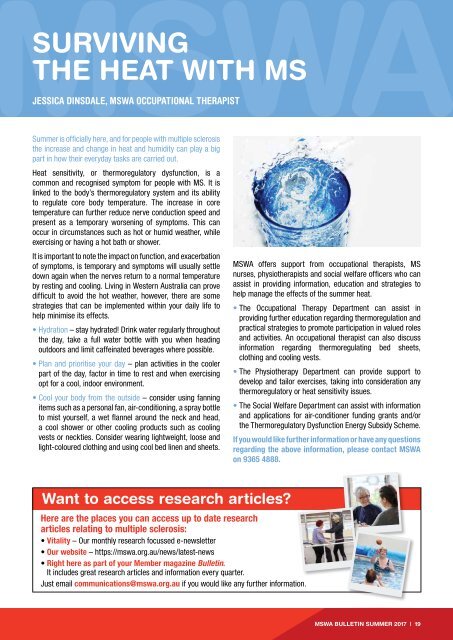MSWA Bulletin Magazine Summer 17
Create successful ePaper yourself
Turn your PDF publications into a flip-book with our unique Google optimized e-Paper software.
SURVIVING<br />
THE HEAT WITH MS<br />
JESSICA DINSDALE, <strong>MSWA</strong> OCCUPATIONAL THERAPIST<br />
<strong>Summer</strong> is officially here, and for people with multiple sclerosis<br />
the increase and change in heat and humidity can play a big<br />
part in how their everyday tasks are carried out.<br />
Heat sensitivity, or thermoregulatory dysfunction, is a<br />
common and recognised symptom for people with MS. It is<br />
linked to the body’s thermoregulatory system and its ability<br />
to regulate core body temperature. The increase in core<br />
temperature can further reduce nerve conduction speed and<br />
present as a temporary worsening of symptoms. This can<br />
occur in circumstances such as hot or humid weather, while<br />
exercising or having a hot bath or shower.<br />
It is important to note the impact on function, and exacerbation<br />
of symptoms, is temporary and symptoms will usually settle<br />
down again when the nerves return to a normal temperature<br />
by resting and cooling. Living in Western Australia can prove<br />
difficult to avoid the hot weather, however, there are some<br />
strategies that can be implemented within your daily life to<br />
help minimise its effects.<br />
• Hydration – stay hydrated! Drink water regularly throughout<br />
the day, take a full water bottle with you when heading<br />
outdoors and limit caffeinated beverages where possible.<br />
• Plan and prioritise your day – plan activities in the cooler<br />
part of the day, factor in time to rest and when exercising<br />
opt for a cool, indoor environment.<br />
• Cool your body from the outside – consider using fanning<br />
items such as a personal fan, air-conditioning, a spray bottle<br />
to mist yourself, a wet flannel around the neck and head,<br />
a cool shower or other cooling products such as cooling<br />
vests or neckties. Consider wearing lightweight, loose and<br />
light-coloured clothing and using cool bed linen and sheets.<br />
<strong>MSWA</strong> offers support from occupational therapists, MS<br />
nurses, physiotherapists and social welfare officers who can<br />
assist in providing information, education and strategies to<br />
help manage the effects of the summer heat.<br />
• The Occupational Therapy Department can assist in<br />
providing further education regarding thermoregulation and<br />
practical strategies to promote participation in valued roles<br />
and activities. An occupational therapist can also discuss<br />
information regarding thermoregulating bed sheets,<br />
clothing and cooling vests.<br />
• The Physiotherapy Department can provide support to<br />
develop and tailor exercises, taking into consideration any<br />
thermoregulatory or heat sensitivity issues.<br />
• The Social Welfare Department can assist with information<br />
and applications for air-conditioner funding grants and/or<br />
the Thermoregulatory Dysfunction Energy Subsidy Scheme.<br />
If you would like further information or have any questions<br />
regarding the above information, please contact <strong>MSWA</strong><br />
on 9365 4888.<br />
Want to access research articles?<br />
Here are the places you can access up to date research<br />
articles relating to multiple sclerosis:<br />
• Vitality – Our monthly research focussed e-newsletter<br />
• Our website – https://mswa.org.au/news/latest-news<br />
• Right here as part of your Member magazine <strong>Bulletin</strong>.<br />
It includes great research articles and information every quarter.<br />
Just email communications@mswa.org.au if you would like any further information.<br />
<strong>MSWA</strong> BULLETIN SUMMER 20<strong>17</strong> | 19


















